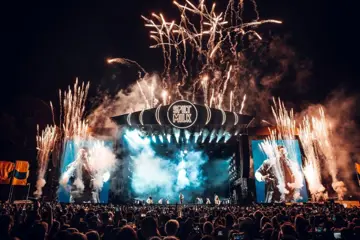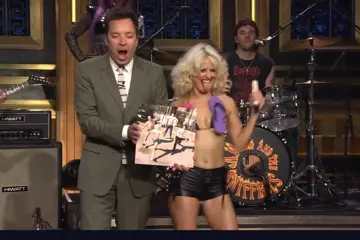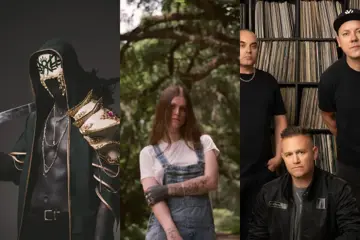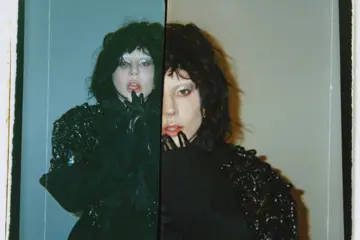Bill Brewster DJs and produces, but he's more famous for being dance music's leading historian. Together with Frank Broughton, he not only started djhistory.com, but has also published the books Last Night A DJ Saved My Life: The History Of The Disc Jockey, How To DJ (Properly) and The Record Players: DJ Revolutionaries. Now the boy from the seaport of Grimsby in England's North-East is touring Australia for the first time.
The big question is: what does this mysterious figure actually spin? "Well, I play across the board, really," Brewster says from Japan. "I play a lot of new music as well as old music. I try to mix up some classics with stuff that I've only just bought, stuff that I've just been given... So it might be a mixture of brand new house with maybe a few edits and some disco and maybe a funk track here and there. It depends on the crowd. I'm bringing quite a lot of tunes with me, so I've got the ability to come and switch things around. If something's not working, I'll change it and try some other avenue." Following years of house domination, eclecticism is back in vogue, he says. "I did a gig in Greece recently where I just played disco all night and it really worked."
Brewster began DJing in the mid-'80s. (Intriguingly, he previously fronted a new wave band, Group Therapy.) He was already writing, initially for a football 'zine, then Mixmag. In the '90s Brewster transplanted to New York to join DMC's US arm, the experience giving him a fresh perspective on house music's origins in disco. Back in the UK, Brewster worked extensively behind the scenes at labels. He's long promoted the Low Life parties. And Brewster was an early resident at Fabric.
EDM (Electronic Dance Music), as it's now tagged, is often deemed ephemeral compared to rock or even R&B. But in later years several books have historicised dance – and DJ – culture, none better than Last Night... Brewster admits that the response to the book, translated into different languages, was "amazing". "We knew that we'd written a good book when we finished it. If we sold 50, 000 copies over our lifetime, we'd be really, really happy, but I think we've sold about 150, 000 copies now. It's far surpassed our expectations." He's frequently asked questions at gigs – and punters want him to autograph copies.
Ironically, many of those DJs who are now bona fide pop stars – inevitably born after the '80s' Summer of Love – are ignorant of house music history. David Guetta has revealed that his protégé Nicky Romero didn't know Lil Louis' Chicago house classic French Kiss. Is Brewster perturbed? "Each person is different. I remember when I was 17, I was really interested in the music that had come before my time – because when you're reading about music that's happening now, there are often cross-cultural references to things that have happened in the past, or people might mention an artist who sounds similar to this new artist. All of those things piqued my interest, so I'd go back and try to work out who they were." Brewster, into punk, was curious to learn about, say, MC5. "Hopefully, the new generation will do the same for current music. All music has a context – and needs a context – and one of the advantages of knowing quite a lot about the history of music is you can sometimes pull out stuff that was made 20 or 30 years ago or even just five years ago that suddenly sounds current because of the trends in dance music at any particular time. I think that context helps give people a greater understanding of what dance music's about."
Brewster has checked out other tomes, among them Simon Reynolds'. The seasoned rock critic authored Generation Ecstasy: Into The World Of Techno And Rave Culture. "I read all the books that come out onto the market, generally – including Simon's. Simon's a great writer, I really like his books, but he deals with dance music in a more sociological way than I do – he's more academic. I'm not academic at all, I left school at 15 with no qualifications [Brewster was briefly a chef], so the books that we've always written we've written from, I suppose, a more populist perspective. But also Last Night..., for example, is a straight history. We're not theorising what happened – and why it happened. We're telling people what happened and they can work out their own theories based on what we document. So we've tried to keep the books kind of amusing, but with lots of history in them."
Reynolds is contentious – and on occasion culturally insensitive when writing about black music subcultures. Despite his theoretical approach, he expresses a peculiar anti-intellectualism – bordering on hostility – towards the Detroit techno contingent of Derrick May, Jeff Mills and Underground Resistance. Brewster is diplomatic. "I think techno has been over-intellectualised. I don't see it as being particularly more intellectually rigourous than house music... They made it sound more intellectually challenging and interesting than house music, but I don't think there's really any difference between techno and house music. The only difference is that there weren't as many vibrant clubs in Detroit, so the guys producing that early music were kind of imagining things in their heads, rather than actually seeing it played out on a dancefloor – although most of them were driving through to Chicago and hearing those records played by Ron Hardy."
Some old schoolers worry that the art of DJing has declined amid radical technological changes – but not Brewster. The veteran isn't adverse to laptop DJs, himself favouring CDs for their practicality (he can travel with more music). Brewster uses Traktor at home. His main concern with digital music is that it's less "special" than vinyl – and anonymous. He's repeatedly sent music without basic information, such as the artist's name. "I find that really bizarre!" Brewster predicts that in the near future DJs will tour with nothing more than a memory stick.
Brewster's writing projects have necessitated he sideline his own studio career, the Brit producing from his time in NY, though he's assembled numerous compilations. The Record Players..., a collection of DJ interviews, will be published by Virgin Books in September. Even now, Brewster and Broughton have an idea for another book (the subject matter is a secret). Nevertheless, Brewster is releasing a single through the Dutch label Rush Hour with mate Alex Tepper (ex-Futureshock) as Hotel Motel. "I'm always trying to do [music] but, when you're writing and doing other journalism and DJing, it's hard to fit it all in. My studio forays are intermittent rather than regular, which is a bit frustrating, but I can't do everything."















